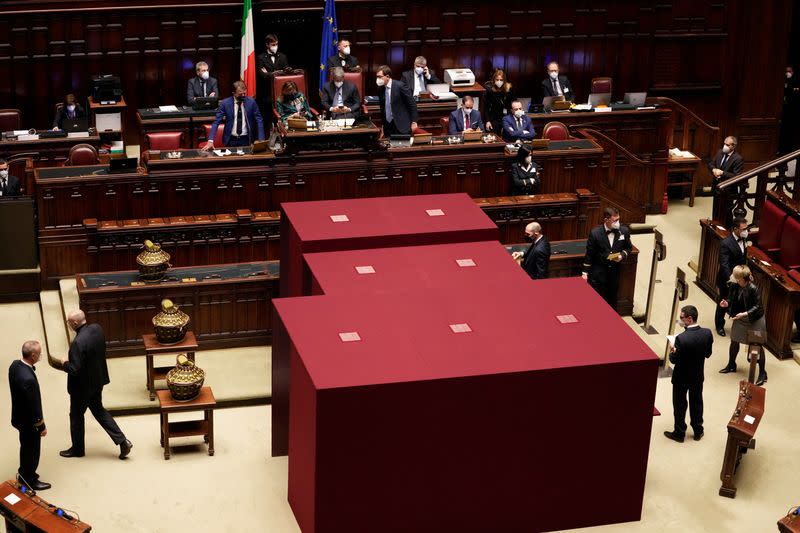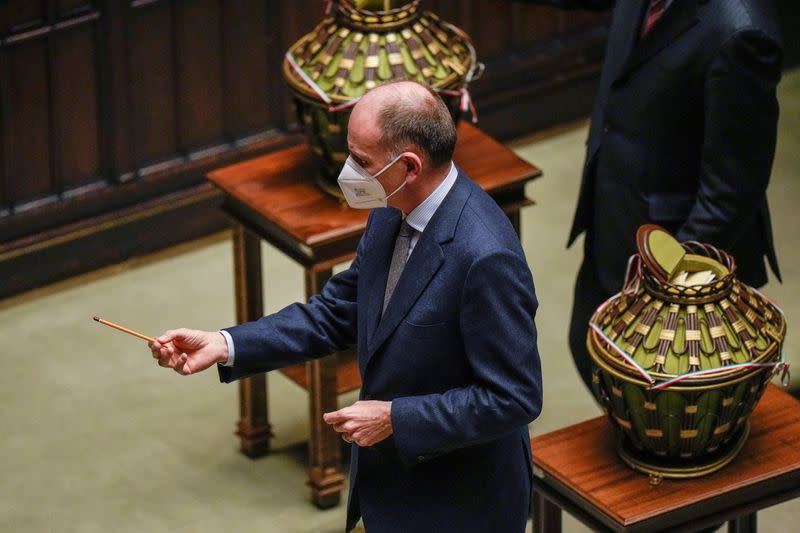Deadlock over Italian presidency as centre-right proposals fall flat
By Angelo Amante, Crispian Balmer and Gavin Jones
ROME (Reuters) -Italy's lawmakers failed on Tuesday for a second day running to elect a new head of state, with party leaders struggling to find a consensus candidate.
Although Prime Minister Mario Draghi remains a frontrunner, worries that his promotion to president might cause his coalition government to disintegrate and trigger early national elections have clouded his prospects.
Much is at stake. The Italian presidency comes with a seven-year mandate and has considerable power - including appointing prime ministers and dissolving parliament - to resolve political crises that regularly batter the country.
After days of behind-the-scenes meetings, centre-right parties named three possible candidates from conservative ranks that they said deserved consideration - a former Senate speaker, a former mayor of Milan, and a retired magistrate.
The centre-left bloc swiftly dismissed the trio and called for talks with the centre-right on Wednesday to resolve the dispute, which risks destabilising Italy as it struggles to overcome the COVID-19 crisis and rebuild its shaky economy.
"Our proposal is to lock ourselves in a room and throw away the keys, with only bread and water on hand until we reach a definitive solution," said Enrico Letta, head of the co-ruling Democratic Party (PD).
Unlike in the United States or France, where presidents get elected in a popular vote, in Italy, some 1,009 parliamentarians and regional representatives choose the new president by secret ballot, which party leaders sometimes struggle to control.
The centre-right has more electors than the centre-left bloc, but neither side has enough votes to ram through their candidate, meaning some sort of compromise deal will be needed.
RACE GETS SERIOUS
After Monday's inconclusive vote, the majority of lawmakers once again cast blank ballots on Tuesday - a way of playing for time while their leaders decide what to do.
A successful candidate needs a two-thirds majority in any of the first three rounds of voting, with only an absolute majority required in subsequent rounds. Wednesday's vote looks certain to once again end in failure, with the race only getting serious on Thursday, when the threshold for victory falls.
Until recently, it seemed a near certainty that Draghi would become president. But his chances have dimmed recently, with some politicians arguing he should remain in place to avoid any let-up in the battle against a resurgent COVID-19 and to ensure Italy receives billions of euros from EU pandemic relief funds.
If Draghi - a former European Central Bank president - is promoted, parties will want a deal in place beforehand on who should replace him at the head of the unity coalition.
Even if he remains prime minister, Draghi himself has warned that his government might nonetheless collapse if the myriad coalition partners fail to agree on a presidential nominee.
Although the centre-left had been expected to reject the centre-right's initial proposals, alternative names have been floated in the media that might prove more palatable to both sides. They include Senate speaker Elisabetta Casellati, former lower house speaker Pier Ferdinando Casini and former premier Giuliano Amato.
Some politicians have also said they want outgoing President Sergio Mattarella to accept a second mandate. He has so far ruled this out.
(writing by Gavin Jones and Crispian Balmer;Editing by Tomasz Janowski and Mark Heinrich)

 Yahoo Movies
Yahoo Movies 


